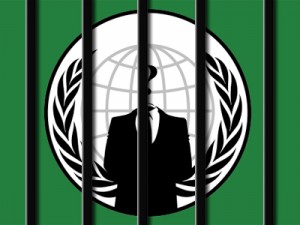21 hacking suspects arrested
Following the arrest of 16 suspected members of a hacker group in the United States, authorities arrested at least five more hackers in the United Kingdom and The Netherlands.
Computer security firm Sophos reported Wednesday (Manila time) that one was arrested in the UK, while Dutch police arrested at least four more.
“The UK’s PCeU (Police Central e-Crime Unit) arrested a 16-year-old youth known as “T-Flow” in South London, on suspicion of breaching the Computer Misuse Act. The teenager is allegedly connected to hacks perpetrated by the LulzSec and Anonymous groups” – the US DOJ said.
It also said the Dutch National Police Agency arrested four individuals for alleged cybercrimes related to the case, but did not give added details.
This brought to at least 21 the number of people arrested over hacking activities in the last 24 hours.
Earlier in the United States, 14 of the arrested were linked to an Internet attack last year against PayPal, for which hacktivist group Anonymous had claimed responsibility.
Anonymous had attacked the PayPal site in retaliation for its withdrawing support for the WikiLeaks site.
“According to the San Jose indictment, in late November 2010, WikiLeaks released a large amount of classified U.S. State Department cables on its website. Citing violations of the PayPal terms of service, and in response to WikiLeaks’ release of the classified cables, PayPal suspended WikiLeaks’ accounts so that WikiLeaks could no longer receive donations via PayPal. WikiLeaks’ website declared that PayPal’s action ‘tried to economically strangle WikiLeaks’” – the US DOJ said.
Authorities in the United States, Britain and the Netherlands have arrested 21 people accused of mounting coordinated cyber attacks against companies and organizations.
The U.S. Federal Bureau of Investigation said Tuesday it had arrested 14 people for allegedly hacking into the servers of a popular website that manages online payments, Paypal, blocking people from being able to access the site.
The FBI said in a statement the suspects, in connection with a group that calls itself ‘Anonymous,’ attacked in retaliation for Paypal suspending the account of the controversial WikiLeaks website.
The FBI said two other people were also arrested Tuesday on separate but similar charges, and that 35 search warrants were executed across the United States in connection with the ongoing investigation.
According to the statement, the remaining five suspects were arrested in Europe (one in Britain and four in the Netherlands).
The Paypal attack suspects are being charged with various counts of conspiracy and intentionally damaging a protected computer. The charges were filed in California, but the 14 individuals arrested across the U.S. are expected to make their first court appearances in their local jurisdictions. If found guilty, the defendants could face a maximum sentence of five years in prison along with a fine of $250,000 for each count of conspiracy. They could face a 10-year sentence and a $250,000 fine on the charge of damaging a protected computer.
Paypal suspended the WikiLeaks account after the site made public hundreds of thousands of classified diplomatic cables in November 2010 – citing a violation of its terms of service. The move meant WikiLeaks could no longer receive donations via Paypal.
FBI special agents have arrested a UCF student for an ‘alleged computer intrusion,’ according to a press release from the FBI’s Tampa Division.
Scott Matthew Arciszewski, a 21-year-old computer engineering major, was arrested ‘without incident’ for his attempt ‘to target and attack the Infragard Tampa Chapter website,’ according to the release.
According to the release, InfraGard is an FBI program ‘designed to establish an alliance between academia, private industry and the FBI.’
Chad Binette – the assistant director of UCF News & Information – said UCF police assisted the FBI in the investigation.
On June 21, 2011, Arciszewski created a post on his website that questioned the security of InfraGard.
According to Arciszewski’s website: “Not only is [InfraGard's] site not safe, secure, or hacker-proof, but it took me less than 5 minutes to find a vulnerability that could potentially allow anyone to hack in and obtain employee login information, which could in turn be used to gain access to other FBI-affiliate websites and compromise national security. Imagine what damage could be caused if a sophisticated hacker decided to look at their website.”
On June 21, Arciszewski also posted on Twitter, under the username voodooKobra: “Infragard Tampa has one hell of an exploit.”
He also posted ‘No matter how intimidating a website or a website’s owners might be, that doesn’t mean it’s necessarily secure’ on that same day.
